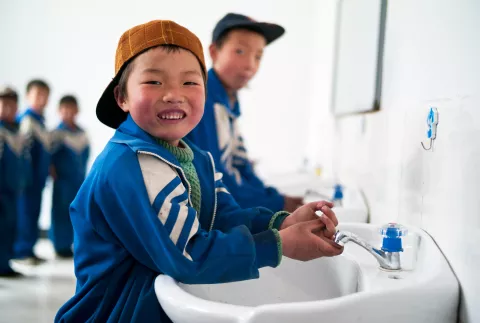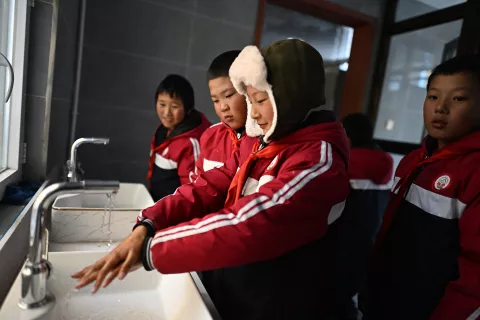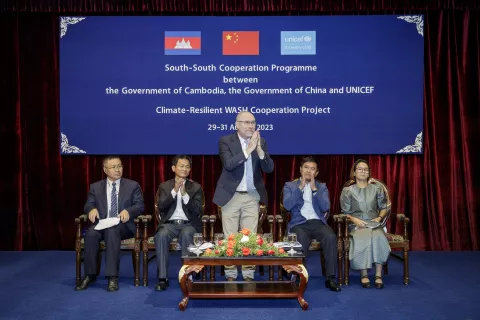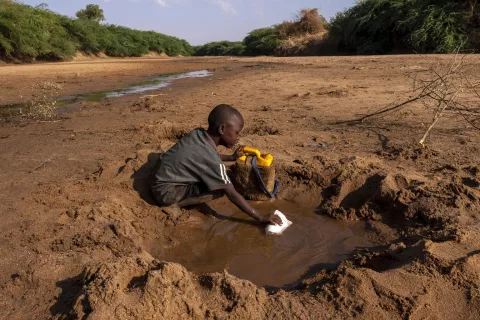Putting WASH on school agendas
Putting WASH on school agendas
- Available in:
- 中文
- English
Three out of four rural schools in China lack safe sanitation facilities and one third of all schools do not have facilities for hand washing. For many generations schools in China have been seen as places for the mind and not the body. In many cases this great reverence for learning has sadly kept educators in the dark about basic concepts of hygiene, sanitation and health promotion in the school setting.
Since late 2012 UNICEF and rural government counterparts in Yunnan, Chongqing, Xinjiang, Guizhou and Guangxi have been hard at work in the FRESH (Focusing Resources for Effective Sanitation and Health) in Child Friendly Schools Project. FRESH aims to change old ideas, instill new habits and turn schools into centres of hygiene, sanitation and health.
Breaking taboos
"Is that WASH (water, sanitation and hygiene) in schools so important? Do we need to learn about it for 3 days?"
These were the honest thoughts shared in early 2013 by Ms. Mu Fei, principal of Yongxi No. 4 primary school in Nayong County, Guizhou.
Several months later Principal Mu participated in UNICEF's school principal training on WASH in schools. The training was part of the FRESH project funded by Japanese clothing retailer UNIQLO. It was her first exposure to information about water, sanitation, hygiene and environment in schools.
After the three day training, her eyes were opened to a new and critically important aspect of school management. Writing to her local education authority and UNICEF after the training she said:
"In the training, a controversial question from the facilitator was: ‘Did you ever eat shit before?'
"We didn't want to answer this disgusting question. However, after much learning about sanitation and disease transmission such as the ‘water, fly and food' demonstration, we had some deep discussions on waste management.
"I must say that I came to realize ‘yes, I have eaten shit before.'"
Prior to the training, Principal Mu and her colleagues had almost no knowledge of the basic facts about latrines, hygiene, disease transmission and sanitation. These subjects were not included in her teacher training courses. What's more, they were considered taboo by most school staff, who regarded sanitation as none of their business.
"In the UNICEF training, I learned a lot," said Principal Mu, "including standards for school sanitary latrines, hand washing with soap, water source protection, safe drinking water, nutrition improvement, school safety and others. Most importantly, I knew that our school has a high risk about water-borne and sanitation-borne diseases transmission."
Big Changes at Xingfeng primary school
Xingfeng primary school is one of the 50 project schools in Zhongxian County, Chongqing Province. With FRESH project support, in 2013 the old school latrine was renovated into a new sanitary one and new hand washing facilities.
After the renovation and construction was completed in August, school children started to enjoy new facilities after the summer holiday. Children were impressed by the big change of school environment. The school principal then organized an essay contest with a topic "The Change."
Sixth grade student Zou Mengyang expressed his surprise and happiness in his essay titled "A little toilet makes big changes."
"Today, what a revolution it is that the toilet floor is clean and safe; no flies, no maggots and no mosquitoes in the toilet room. Shit is no longer visible and water taps are available for washing hands after using toilet. All these changes shocked me with no words to express my feeling and satisfaction."
In her essay, titled "School Corner," fellow sixth grader at Xingfeng School, Fan Yaoyao
"When I first arrived at this school, the toilet was very dirty and smelly. No matter how many times it was flushed, shit was still there being exposed, we then gave up. From time to time, the stinky smell was blown into the classroom making us feel like vomiting."
Now let me introduce to you our new school toilet. It can be flushed now with sufficient water. There is no smell and flies anymore. There is also a handwashing facility installed outside of toilet that I can wash my hands any time to prevent the diseases. There are also a waste water collection and storage tank that water can be used to clean the toilet after the school time, very convenient and water saving."
Action plans
Following their FRESH Project training, Principal Mu and her colleagues resolved to go back to their schools and take quick action to block potential disease transmission routes. Their plans included covering open septic tanks and squat holes, strengthening hygiene education and hand washing practices, managing school solid waste, providing more nutritious food and safer drinking water for students.
Principal Mu is very keen. "I am confident that my school's whole environment will be improved significantly after 3 years."





